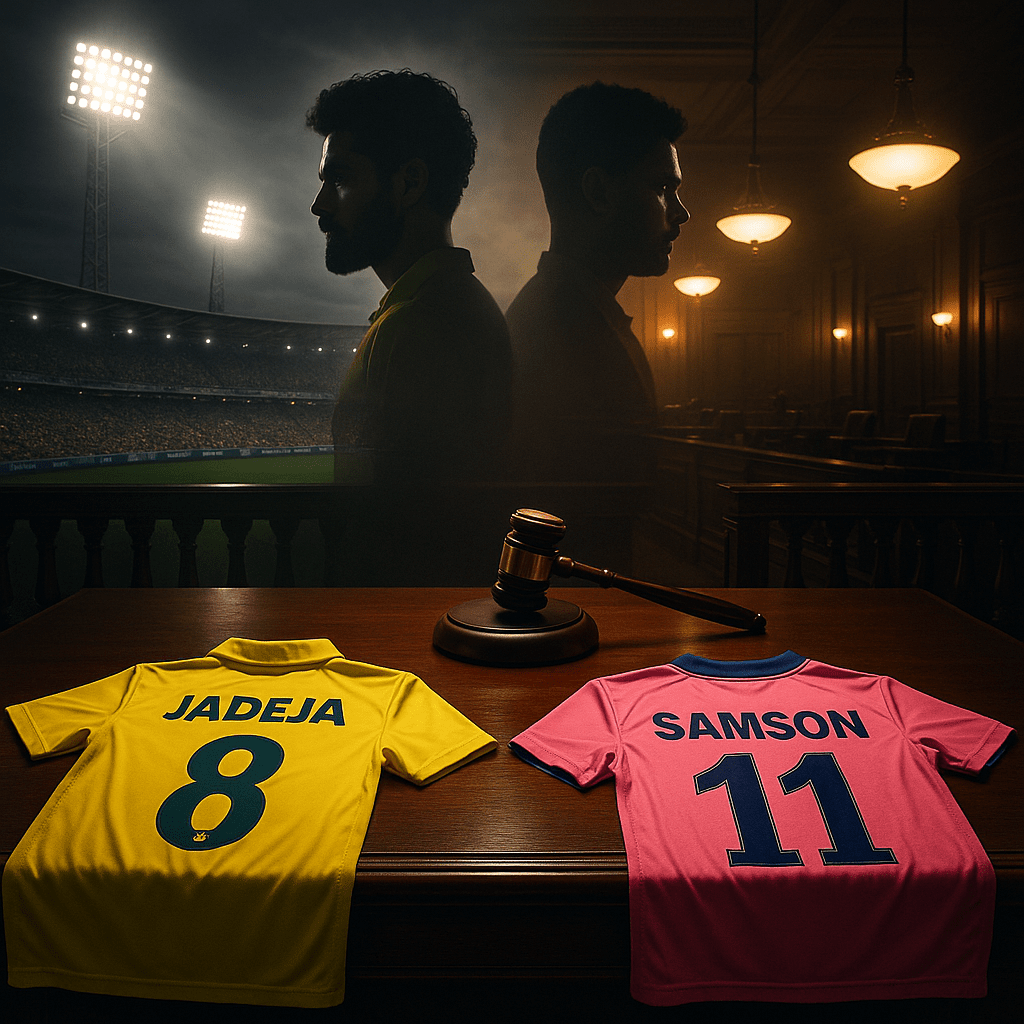
1. Introduction
“Sir Jadeja to Rajasthan Royals.”
That single line felt like someone slowly peeled the yellow jersey off my back. As a lifelong CSK fan, born in Ranchi, raised on Dhoni, and now in Laos with only Hotstar and a significant time difference, this one stung.
But then, the lawyer in me kicked in. How did this happen? Can a franchise really let go of its vice-captain just like that? And what exactly is a “trade” in Indian cricket? Is it like the NBA, where players are moved around like stock options, or is there something more contractual, something more human?
When news broke that Ravindra Jadeja was heading to the Rajasthan Royals, with Sanju Samson joining CSK and Sam Curran thrown into the mix, it felt less like a simple team strategy and more like franchise alchemy. Headlines screamed “blockbuster trade,” but for those of us watching from the legal side of the cricketing world, particularly those of us still processing Jadeja’s departure, something didn’t sit quite right. The fan in me was stunned. The lawyer in me had questions. Most importantly: Are these IPL “trades” really trades in the legal sense, or are they structured as something entirely different under Indian contract law?
This blog argues that what the IPL calls a “trade” isn’t a transfer of assets or rights like in the NBA or even the EPL. Instead, it’s a carefully constructed act of novation under Section 62 of the Indian Contract Act, 1872 — a substituted agreement that requires consent, not just strategy. Players aren’t moved around like tokens. Their contracts are legally extinguished and re-formed, with their full participation and the BCCI’s regulatory blessing.
2. The IPL Trading Framework
On the surface, the IPL player trading system looks like a high-stakes franchise shuffle. Beneath the headlines, however, sits a tightly regulated process governed by BCCI regulations, layered consent requirements, and structural limitations shaped by both commercial and employment law principles.
Trade Windows and Eligibility
The BCCI allows trades only during designated off-season trading windows. These typically begin a few weeks after the season ends and close just before the auction. For instance, the 2025 to 26 trade window ran from June 14 to December 8, 2025.
Players purchased at the most recent auction cannot be traded in the following season. This protects the integrity of the auction and curbs speculative buying. Sam Curran, for example, became eligible for trade only after completing a full season with the franchise that bought him.
One Trade, One Player, Per Season
Franchises are free to pursue as many trades as they wish, but any player may be traded only once in a season. This ensures squad stability and prevents the kind of serial loan chains that often appear in European football.
Consent Is Non-Negotiable
Every IPL trade requires the written consent of the player involved. Under Section 62 of the Indian Contract Act, 1872, a valid novation requires full consent from all contracting parties.
This was evident when CSK’s CEO confirmed publicly that Jadeja was consulted before the deal was finalised: “It is a must that we consult the players concerned… after mutual agreement, we undertook this.”
BCCI as Regulator and Gatekeeper
Every proposed trade must be submitted to the BCCI for scrutiny and clearance. The Board retains veto power and may block trades that disturb competitive balance or breach financial fair play norms.
Financial Structure and Constraints
The IPL imposes a team salary cap of ₹151 crore for IPL 2026, as confirmed in the official auction guidelines. A player’s League Fee, or season salary, is inherited by the new franchise unless renegotiated. Where a salary increase is involved, the added amount is usually shared between the player and the outgoing team.
Take the example of Ravindra Jadeja, Sanju Samson, and Sam Curran—three prominent players involved in recent IPL trades. Jadeja moved from CSK to Rajasthan Royals, with his league fee revised from INR 18 crore to INR 14 crore as part of the trade. Similarly, Samson joined CSK at his existing fee of INR 18 crore, while Curran moved to Rajasthan Royals at INR 2.4 crore, maintaining his existing fee.
These transfers, though labeled as “trades,” are legally novations, where the players’ contracts are terminated with their old franchises and new contracts are created with the new teams, with the full consent of all parties involved. These examples reinforce the legal process of novation that you see in the IPL system—players are not simply transferred; their contracts are re-formed based on mutual agreement and consent.
3. What Actually Happens Legally in a Trade
Despite the sporting terminology, an IPL “trade” has little in common with a corporate asset transfer or stock swap. Legally, what occurs is a three-way contractual realignment, not a change in ownership. The accurate legal term is novation — a concept rooted in Indian contract law.
Novation under Indian Law
According to Section 62 of the Indian Contract Act, 1872, if the parties to a contract agree to substitute a new contract in place of the old one, the original agreement is extinguished. This is novation: a legal mechanism that eliminates prior obligations and creates a fresh agreement that binds the parties to a new arrangement.
This is precisely what happens in an IPL trade:
- The player’s original contract with Franchise A is voluntarily terminated.
- A new contract is executed with Franchise B, with the player’s full consent.
- All parties — Franchise A, Franchise B, and the player — must agree for the transaction to proceed.
The Three-Party Transaction
An IPL trade, from a legal perspective, requires a tripartite agreement. This is not an assignment (which can be unilateral), but a mutual exchange of obligations and rights:
- Franchise A relinquishes its contractual rights and obligations.
- Franchise B assumes those obligations (or redefines them through renegotiation).
- The player consents to the termination of one contract and the formation of another, often with changes to terms like salary, role, or tenure.
BCCI regulations require the player’s explicit written consent to finalize a trade. This mirrors the legal necessity under Indian law that no novation can occur without the full consent of all contracting parties.
Why Consent is Structurally Essential
Unlike U.S. leagues such as the NBA, where most trades involve contract assignments that don’t need player approval unless a no-trade clause exists, the IPL framework is fundamentally different. Here, consent isn’t optional — it is the legal foundation of the transaction. The CSK-Rajasthan-Jadeja deal highlights this, with all parties confirming mutual agreement before execution.
Without novation — and without consent — there is no trade. What the IPL calls a “trade” is, in fact, a series of simultaneous contract dissolutions and formations, governed by both private league rules and public contract law. Each time this occurs, it reaffirms the idea that IPL players are not tradable commodities, but contractual actors with enforceable rights.
4. Why IPL Trades Are Legally Novations and Not Trades
What the IPL calls a “trade” closely resembles novation under Section 62 of the Indian Contract Act, 1872, rather than a commercial asset transfer. Unlike the NBA or EPL, where contracts or federative rights can be transferred from one team to another, IPL player contracts are terminated and re-formed with the new franchise. This process of ending one contract and creating another with the player’s consent is not a “trade” in the traditional sense but a novation, where the old obligations are extinguished, and new ones are formed.
Indian courts uphold that personal service contracts, like those in the IPL, cannot be assigned due to their reliance on mutual trust and consent. This means Franchise A cannot simply “hand over” the player’s contract to Franchise B. Instead, all parties—Franchise A, Franchise B, and the player—must consent to the new agreement. This mirrors novation, a legal process requiring the explicit agreement of all parties.
Unlike the NBA, where trades often happen without player consent unless a no-trade clause exists, IPL trades require the player’s full approval, making consent a central element of the transaction. Without it, there is no trade. This makes IPL trades fundamentally different from those in leagues where players are treated as assets moved at will.
In the EPL, transfers involve two steps: the selling club gives up its federative rights under FIFA rules, and the player then negotiates a new contract with the buying club. The player cannot stop the transfer itself, only reject personal terms. In the NBA, trades work through contract assignment under the Collective Bargaining Agreement, with players having veto power only if they hold a no-trade clause. In both systems, player agency is limited. This contrasts with the IPL, where a trade cannot occur without the player’s explicit consent, making the process far closer to novation than asset transfer.
What sets the IPL apart is its emphasis on player consent and novation. Unlike the NBA’s asset transfer system or the EPL’s federative rights transaction, the IPL treats players as contracting parties who must actively consent to their trade. The process involves the termination of the old contract and the creation of a new one with the new franchise, transforming the IPL’s trade system into a legal novation in contract law, driven by mutual agreement and consent. This player-centric approach offers IPL athletes a degree of autonomy and legal protection that is rare in other major sports leagues.
5. Legal Takeaways for Practitioners
Understanding IPL trades is not just about memorising rules. It is about recognising the legal principles at play, particularly those involving contract law, player rights, and the BCCI’s regulatory oversight. The key takeaways for practitioners are set out below.
IPL Trades Are Not Asset Transfers
Unlike the NBA’s asset-based system or the EPL’s federative rights transfer model, an IPL trade functions very differently. It is not an asset transfer. It is a novation, which is a legal process in which the player’s old contract is terminated and a new one is created with another franchise. This mechanism is grounded in Section 62 of the Indian Contract Act, 1872, which governs the substitution of contracts through mutual consent.
The central distinction is simple: an IPL trade requires active, voluntary participation from all parties involved. The player, the outgoing franchise, and the incoming franchise must all agree. As a result, IPL players are not treated as assets that can be shifted at will, but as contracting parties with enforceable rights.
Player Consent Is Legally Binding and Non-Negotiable
In the IPL, player consent is not a formality. It is a legal requirement. Without that consent, the trade cannot move forward. This ensures that players retain agency and are never treated as commodities.
This level of contractual control gives IPL players meaningful leverage. In contrast, the NBA often allows teams to transfer player contracts without needing consent, unless a no-trade clause exists.
Franchise Control Is Bounded by Employment and Regulatory Law
IPL franchises enjoy considerable freedom in shaping their squads, but that freedom is limited by employment law, the Indian Contract Act, and the BCCI’s regulatory framework. A franchise cannot unilaterally alter the terms of a player’s employment. Any change, whether a salary revision or role adjustment, must comply with contract law and the principles of consent.
In addition, franchises must satisfy the BCCI’s oversight on matters such as salary caps, foreign player quotas, and financial fairness. The BCCI’s role is to maintain competitive integrity and protect player welfare, and it acts as the final gatekeeper for approving trades.
Risk Factors: Consent, Re-Contracting, Regulatory Overreach
IPL trades come with legal risks that practitioners should be aware of:
- Breach of consent: If a player withdraws consent at any stage, the trade may collapse and could trigger contractual disputes.
- Failure to re-contract properly: If the new contract does not comply with Indian contract law or BCCI regulations, the trade may be challenged or deemed unenforceable.
- Regulatory overreach: If the BCCI’s approval process is viewed as excessive or its veto power appears arbitrary, this could invite legal scrutiny, including challenges related to anti-competitive behaviour under the Indian Competition Act, 2002.
6. Conclusion
At the end of all this, the IPL idea of a “trade” feels less like a dramatic player swap and more like a carefully stitched contract makeover. Once you peel off the cricketing hype, what you really see is a system built on consent, new agreements, and a regulator watching from the balcony with folded arms. In the IPL, players do not get passed around as chips on a table. They step into a new contract only after the old one is cleanly closed and every party involved agrees to it. This is what makes the IPL model stand out. While leagues abroad often let teams treat contracts as tradable property, the IPL holds on to something far more human: genuine agreement. It gives players agency, and it forces franchises to behave like disciplined commercial actors rather than overeager traders. But with the money rising and player movement becoming a yearly subplot, each trade now feels like a small transaction that could go wrong if someone blinks. A missed consent email, a sloppy re-contracting step, or a harsh regulatory veto could easily turn into a legal fight, an arbitration, or even a competition law headache. The risks are no longer theoretical. They are sitting quietly in the background, waiting for the wrong deal to test the system.
The IPL’s system works today because it respects legal fundamentals and insists on clarity and consent. The moment a top player refuses to sign, or a franchise pushes the line, or the BCCI oversteps, the entire structure will be tested. Until that day comes, every IPL “trade” remains exactly what it is in legal terms: not the movement of an asset, but the birth of a fresh contract. And for someone who grew up watching Dhoni and now watches the IPL from a different time zone, it is strangely comforting to know that behind all the noise, the law quietly keeps the league honest.







